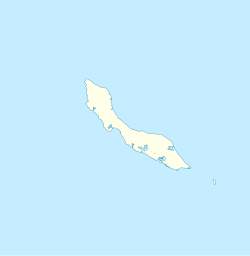Bandariba
Bandariba | |
|---|---|
 Aerial view of Santa Barbara | |
| Coordinates: 12°05′36″N 68°49′54″W / 12.0932°N 68.8317°W | |
| State | Kingdom of the Netherlands |
| Country | Curaçao |
| Population (2011)[1] | |
• Total | 20,838 |
| Climate | BSh |
Bandariba (also: Banda'riba) is a district of the island of Curaçao. It is one of the three districts and encompasses the south-eastern part of the island.[2] The name is Papiamentu and translates to "upside".[3] The district contains the towns and villages of Santa Rosa,[4] Spaanse Water,[5]: 6 Montaña,[6] Seru Grandi,[7] and Oostpunt.[3]
History
[edit]In 1634, Curaçao was conquered by the Dutch West Indies Company, and the city of Punda was founded. In order to feed the population, plantations were established on the island.[8] The plantations were small-scale due to the infertile ground and produced yams, mangos, oranges, or raised livestock.[9] Bandariba later attracted free and freed slaves who settled in the vacant land.[10]
In the 19th century, the Roman Catholic church founded the villages of Santa Rose and Montaña in order to educate and convert the former slave population.[5]: 6 In 1875, a large-scale phosphate mine was opened near the Tafelberg,[11] In 1927, Royal Dutch Shell built an oil terminal at Spaanse Water.[12]

The current division of the island dates from 1930 when Willemstad was extended to include most of the suburbs.[13] During the late 20th century, tourism became important and Bandariba saw the development of tourist resorts.[14]
The village of Oostpunt, the most eastern point of the island, is private property of the Maal family,[3] and most of the 54 square kilometres (21 sq mi)[15] area surrounding the villages of Oostpunt, Sint Joris, and Santa Catharina[16] is off limits.[17] The village of Oostpunt is only inhabited by Willy Maal and his mother.[18] Oostpunt covers about 10% of the island.[16]
Villages
[edit]- Montaña Abou[6]
- Montaña Rey[6]
- Nieuwpoort[19]
- Oostpunt[3]
- Santa Barbara[5]
- Santa Rosa[4]
- Seru Grandi[7]
- Spaanse Water[5]: 6
References
[edit]- ^ "Census 2011". Central Bureau of Statistics. Retrieved 22 April 2021.
- ^ "Noordwest-Curacao". Op Naar Curaçao (in Dutch). Retrieved 24 April 2021.
- ^ a b c d "Where is Curacao Located?". Villa Sea Shell.
- ^ a b Buurtprofiel Santa Rosa (2011). "Buurtprofiel Santa Rosa" (PDF). Government of Curaçao (in Dutch). p. 8.
- ^ a b c d Buurtprofiel Spaanse Water (2011). "Buurtprofiel Spaanse Water" (PDF). Government of Curaçao (in Dutch).
- ^ a b c "Buurtprofiel Montaña Abou" (PDF). Government of Curaçao (in Dutch). p. 9.
- ^ a b "Buurtprofiel Seru Grandi" (PDF). Government of Curaçao (in Dutch). p. 14.
- ^ "11. De ontwikkeling van bewoning buiten Willemstad". Canon of Curaçao (in Dutch). Retrieved 22 April 2021.
- ^ "De slaven Opstand van 1795". Knipselkrant Curaçao (in Dutch). Retrieved 22 April 2021.
- ^ "Sambubu". Amigoe via Delpher (in Dutch). 24 February 1972.
- ^ Benjamins, Herman Daniël; Snelleman, Johannes (1917). Encyclopaedie van Nederlandsch West-Indië (in Dutch). Leiden: Martinus Nijhoff Publishers. p. 560. Retrieved 24 April 2021.
{{cite book}}:|website=ignored (help) - ^ "Fort Beekenburg" (in Dutch). Retrieved 24 April 2021.
- ^ "Nieuwe Indeeling van Curaçao". De Tijd via Delpher.nl (in Dutch). 30 October 1930. Retrieved 22 April 2021.
- ^ "Spaanse Water Jan Thiel" (in Dutch). Archived from the original on 18 December 2021. Retrieved 24 April 2021.
- ^ Buurtprofiel Oostpunt 2011, p. 10.
- ^ a b Buurtprofiel Oostpunt 2011, p. 6.
- ^ Buurtprofiel Oostpunt 2011, p. 8.
- ^ Buurtprofiel Oostpunt 2011, p. 24.
- ^ "Nieuwpoort". TUI (in Dutch). Retrieved 24 April 2021.
Bibliography
[edit]- "Buurtprofiel Oostpunt" (PDF). Government of Curaçao (in Dutch). 2011. p. 6. Retrieved 24 April 2021.

